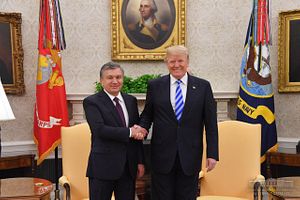As it became clear early on November 6 that former U.S. President Donald Trump would return to the White House as the United States’ 47th president – the first felon to win the office – congratulations poured in from across the world, including the Central Asian states of Kazakhstan, Kyrgyzstan, and Uzbekistan.
Whether Trump or Vice President Kamala Harris had won, the congratulations would roll in much the same. But the messages do provide a glimpse as to what the Central Asian states wish to see from the next U.S. administration and how they aim to position themselves.
Kazakh President Kassym-Jomart Tokayev’s office issued a brief statement of congratulations. “The head of state expressed confidence in the progressive development of bilateral cooperation in the areas of security, non-proliferation of nuclear weapons and investment,” it read, highlighting Kazakhstan’s priorities in the relationship. “The President of Kazakhstan wished Donald Trump success in his work for the benefit of the prosperity of the American people and ensuring global stability and security.”
Kyrgyz President Sadyr Japarov said in a statement that he believes Trump’s “leadership experience and deep knowledge will create opportunities for further deepening comprehensive cooperation between Kyrgyzstan and the United States of America, based on the principles of mutual respect.” He added that through joint efforts “we will be able to successfully overcome the upcoming global challenges and raise our partnership to a new level for the sake of prosperity and the future of our peoples.”
Japarov concluded with a commitment of his own, “I assure you that I will make every effort to develop multi-vector cooperation, which opens up broad opportunities between the Kyrgyz Republic and the United States of America.”
(As of writing, Tajik President Emomali Rahmon and Turkmen President Serdar Berdimuhamedov had not yet issued congratulatory statements).
Uzbekistan’s President Shavkat Mirziyoyev issued the longest and most detailed congratulatory statement so far.
Congratulating Trump on his “convincing victory,” Mirziyoyev offered his interpretation of the win as confirmation that “the American people actively support your programs and plans aimed at strengthening the international authority and economic power of the United States, ensuring global development and prosperity, as an experienced and skillful politician.”
Mirziyoyev then turned to noting the United States’ “unwavering position… in supporting the independence, sovereignty and territorial integrity of our country, as well as the ongoing support provided to our large-scale reforms, which have become irreversible.”
The Uzbek president then pivoted to recalling his official visit to the White House in 2018. He was the first Uzbek leader to make such a visit to Washington since Islam Karimov in 2002.
Mirziyoyev’s note continued with his offering of support for “further expansion of regional cooperation within the framework of the C5+1 platform and the Central Asia-U.S. Trade and Investment Agreement.” He went on to name an array of areas for cooperation: “political and diplomatic, trade and economic, banking and financial, energy, transport spheres, as well as in agriculture, digitalization, innovation, education and other areas with new projects.”
After a sentence regarding Afghanistan – “promoting its economic and social development will become an integral part of our cooperation” – Mirziyoyev invited Trump for an official visit to Uzbekistan.
To date, no sitting U.S. president has ever traveled to Central Asia.
In contrast, it appears that Mirziyoyev issued no such detailed message to then-President-elect Joe Biden upon his 2020 victory, instead the Uzbek president issued a one-sentence congratulatory message that coincided with Biden’s January 2021 inauguration.
Taken together, the three congratulatory notes provide a framework for how these Central Asian states view their relations with the United States and highlight their own domestic priorities. Notably, and predictably, any references to “human rights” or “democracy” are absent. These are not issue areas Trump has promoted as priorities, nor points of emphasis for Central Asian presidents. “Security,” stability,” and “prosperity,” however, get top billing, as do laudatory platitudes, clearly aimed to stroke Trump’s ego.
As numerous commentators observed during Trump’s first term, from 2017-2021, the former and future president is rabidly susceptible to flattery. In August 2024, as the election loomed, H.R. McMaster – who served as Trump’s national security adviser from February 2017 to April 2018 – published a memoir. In an excerpt published by the Wall Street Journal McMaster remarked upon Trump’s relationship with Russian President Vladimir Putin: “Putin, a ruthless former KGB operator, played to Trump’s ego and insecurities with flattery.”

































